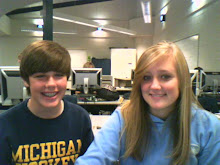Over the course of the semester, I learned a lot. We covered a lot of material, from the use of periods and commas to what happened with the Rwandan genocide.
The first thing I learned was how to write a good thesis. When I first came in the beginning of the year, I
wasn’t exactly sure what a thesis was supposed to have in it. I learned that the theses should be an introduction to what you are writing about, and should help your paragraph stay on topic. When we started actually writing papers, I figured out how. When we wrote our letters as Paul
Rusebigina during the Rwandan genocide unit, I made sure that all the writing led back to my theses statement. For a paragraph where I wrote about why the I
nterahamwe were killing, my thesis was “The
Interahamwe are being persuaded to kill.
Another thing I learned was how to comprehend something that I don’t know anything about. When we first started having a weekly article from the New York times, it was really hard. As we did more and more, I figured out that I needed to define all the words, and then put the sentences together to get the gist of it. It took a lot of practice, but after a while I started getting higher grades on the responses from understanding the articles better.
By listening to The Man in the Well, I learned how to think about things at a deeper level. When we first heard the story, I
wasn’t really sure who the man could’
ve been. Was It a robber? A homeless man? Someone who was just trapped? It took me a while to figure out that it could’
ve had more of a meaning.
The class discussion helped a lot. I discovered that the man
didn’t really have to be a man. It could’
ve been the children’s conscience, or anything else like that. Now when I read things, I take into consideration that there could be a deeper meaning.
Researching the countries we were learning about on the computer helped me a lot also. In the beginning of learning about each country, I
didn’t have any background knowledge. Each time we were assigned to look certain things up, I learned a lot. If we
hadn’t done this, I
wouldn’t know as much as I do now. The articles we printed were mostly details about the countries. This helped me a lot for the Rwandan genocide debate, and the South Africa quiz.
Margin notes helped me understand things a lot better. When we did the articles from the new York Times and had to decode and understand them , I still had questions. Margin notes gave me a chance to answer those questions, and make comments to think about. They really helped me have a better understanding, and also compare and contrast with other things we’
ve been learning.




